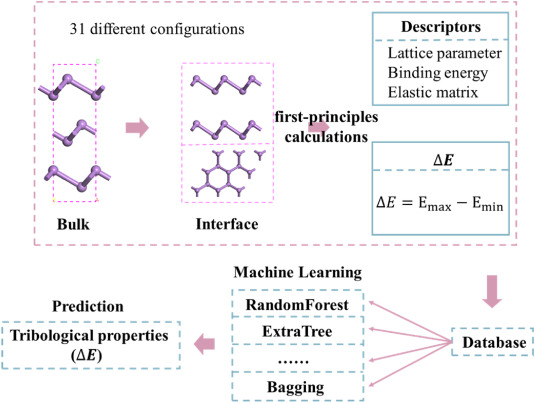Abstract
Recently, many novel two-dimensional materials have been identified through data-driven computational methods, whose tribological properties are bound to be further investigated. Here, the first principles calculation and machine learning were combined to predict the maximum sliding potential barrier of elemental two-dimensional materials and the importance of different descriptors were discussed. Due to literature reports and high correlation coefficients, RF and Bagging algorithms are used to present the final prediction results. The prediction results show that R-2 is about 0.8, and the root mean square error (RMSE) of similar to 0.0027 eV and 0.0029 eV, respectively. Importantly, when considering the interfacial charge transfer as the eigenvalue, the R-2 of both models increased (R-2 can reach 0.89), and the RMSEs decreased to similar to 0.0020 eV and 0.0024 eV. This indicates that interfacial charge transfer has a significant impact on the prediction of the maximum sliding energy barrier. That is, adjusting the charge transfer at the interface can improve the tribological properties of the interface. In addition, the geometric structure, such as lattice parameter, and mechanical properties of the material are also important factors affecting its maximum sliding energy barrier. Compared with traditional first principles calculation, machine learning based on statistics may be a promising choice for predicting friction performance, and it is expected to find the influencing factors directly related to friction behavior.

Keywords Plus:ATOMIC-SCALE FRICTIONELECTRONIC-PROPERTIESTRANSITION-METALGRAPHENEHARDNESSWEAR
Published in CERAMICS INTERNATIONAL,Volume49;10.1016/j.ceramint.2023.04.229,AUG 1 2023


